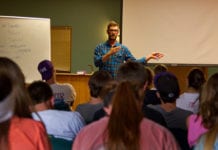1. What are some things a group leader must keep in mind when leading a group of this nature?
Some decisions we had to make early on where:
* What bible study curriculum do we use? There are a lot of good materials out there, developed specifically for adults with cognitive / learning disabilities. I spoke to many church special needs ministries in our area and finally settled on a curriculum distributed by Lifeway Christian Stores (Bible Studies for Life: Access Learner Guide).
* How often do we meet each month and when? Realizing that our families already have a busy schedule, we wanted to make sure that coming to our group gathering did not become “just another meeting to go to”. Additionally, we wanted to make it convenient so we settled on the time frame just prior to our Friday evening Church worship service which begins at 7 pm. We decided on meeting twice a month (which fits into the Life Group model endorsed by our Small Group Ministry team) and meet from 5:30 to 7:00 PM. The content of our meeting is in the paragraph below.
* Our greatest challenge was creating an agenda that appealed to each of the families and the unique challenges faced by each of their young adults’ disabilities. We have a diverse group of adults; some can read, others cannot; some are able to sit for an extended period, others cannot (or so their parents thought until they entered our “circle time”!). So again, I visited many of the existing groups in the area and brought together many of the activities that worked well for them.
2. What does a typical meeting look like?
Our meeting begins with a social time of gathering and relationship building which usually lasts for about 30 mins. Families filter in and bring food for our “potluck” meal, we eat and and share with one another. This is a much needed time and forms the basis of our family “support group” activity. We are looking at expanding this activity by forming a separate “Life Group” for the parents with a separate meeting time. We will be evaluating this need in 2012.
From eating/socializing we move into our “circle time”. I set up a group of chairs in a large circle and we move into a time specifically focused on meeting the needs of the young adults. It begins with about 10 mins of singing followed by a 20-30 min bible study. Due to the diverse nature of the group (full spectrum of special needs) I try to keep it engaging with readings, Q&A and lot’s of visual aids to reinforce learning. The message is kept simple and repeated often.
We initially thought the parents would move off to a separate area and continue to socialize but that’s not what happened! They ALL pulled their chairs into a “second row” around the circle of young adults and showed great interest in seeing their young adult interact within the dynamics of the group. This has been a highlight for the parents as they are encouraged by the interaction and often times amused by what is said (do you remember the show “kids say the wildest things”?).
The next phase of the meeting is prayer time where we go around the room and each young adult shares with the group how we can pray for them in the next week. Praises are shared, as well as prayer requests. If we have time, we share a couple more songs and then close by asking for a volunteer(s) to lead the closing prayer. We are amazed each week by the beautiful words spoken by these young adults who speak from their hearts.
Another area of challenge is keeping the group connected between meetings. We primarily use email but will be looking at using Facebook to create closed “groups” for both the parents and young adults. Not everyone is on FB (believe it or not….) so we are not sure if that will work or not. My hope is that the young adults use the closed FB group to keep in touch and share with one another what is going on during the week. Parents will monitor the site!
I am also looking at setting up a “mentoring” program within the group. Due to the diverse “abilities” of the group, some young adults would benefit greatly from having a “mentor” to help them grow and develop as a person within the group. My challenge will be “pairing” up the mentor-mentees and helping them develop the appropriate relationship.
Much thanks to Andrew for taking us into places many of us haven’t even considered. If you’re leading a small group ministry and you don’t have a group specifically designed for adults with disabilities, you may need to seriously consider this. After all, everyone needs someone to encourage them and help them on their journey toward spiritual maturity.
Home Small Group Leaders Small Group Leaders Blogs Small Groups for Adults With Disabilities… Amazing Stuff!
Small Groups for Adults With Disabilities… Amazing Stuff!
A few months ago I began to hear rumors of a small group specifically designed for young adults with disabilities. This fascinated me as I believe that every believer was meant for community, that everyone is equal, and that everyone deserves to be part of a group that meets them where they are, encourages them in their journey, and respects them in the midst of that journey. It took only a few conversations to find the individual who leads this group. His name is Andrew Bouma and his group is part of the small group ministry at Chase Oaks Church in Plano, Texas.
Andrew gave me a little history and inspired me with a handful of words. He said,
“This entire journey has been inspirational for all involved! We began last spring with an informational meeting with about 20 in attendance (including young adult and parents). Today, we have more than doubled our attendance to about 20 young adults plus 1-2 parents each. Our Fall Lifegroup launch party had 45 in attendance! When I run into one of our young adults between the weeks of our meetings, their first question is “when is our next meeting?”. Parents alike are thankful for this opportunity to become part of an active, loving support group and see their young adult excited about gathering with others to sing, pray and learn about our wonderful Creator, God and Savior Jesus Christ.”
I asked Andrew to answer a few questions, very practical stuff, that might be helpful to all of us. You’ll see his responses below.










